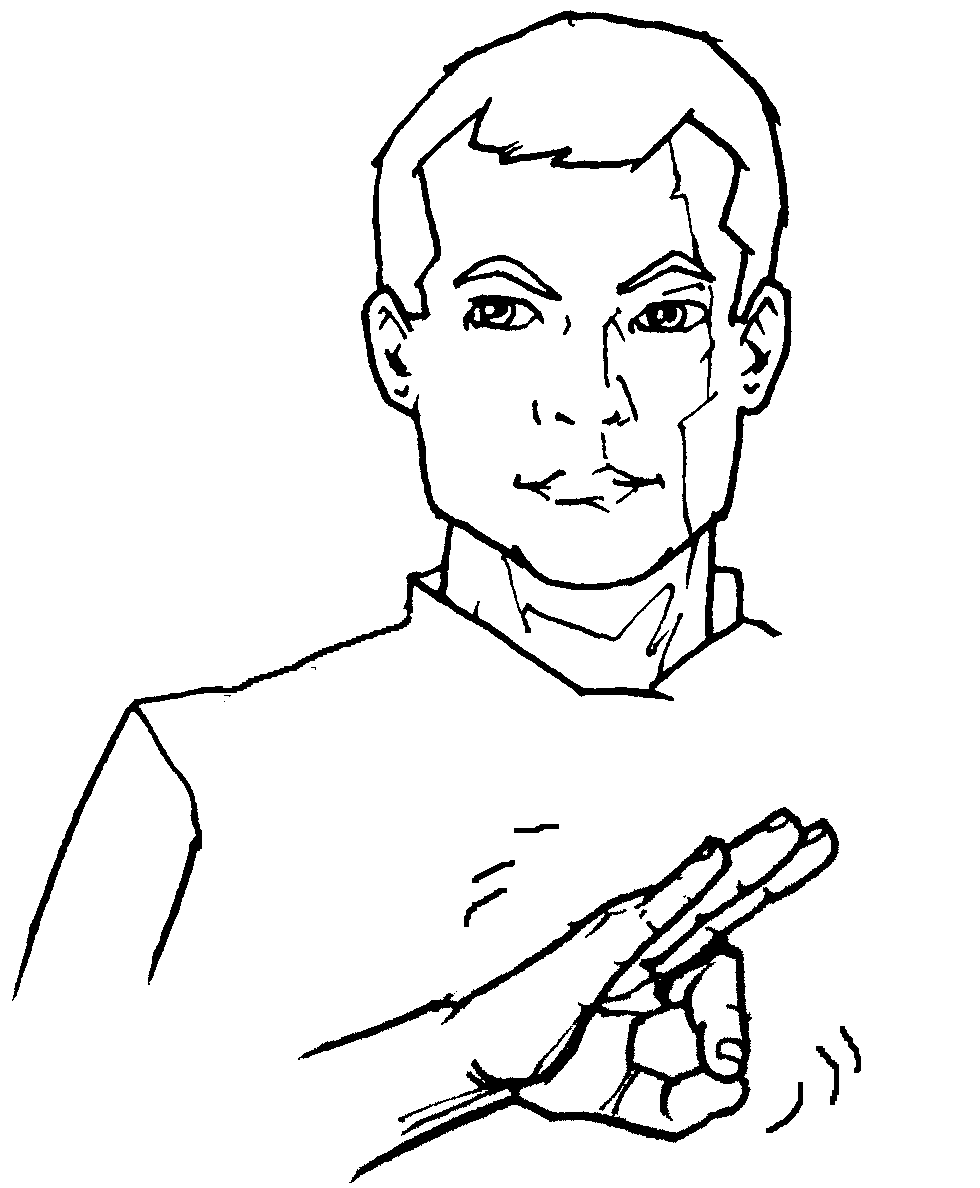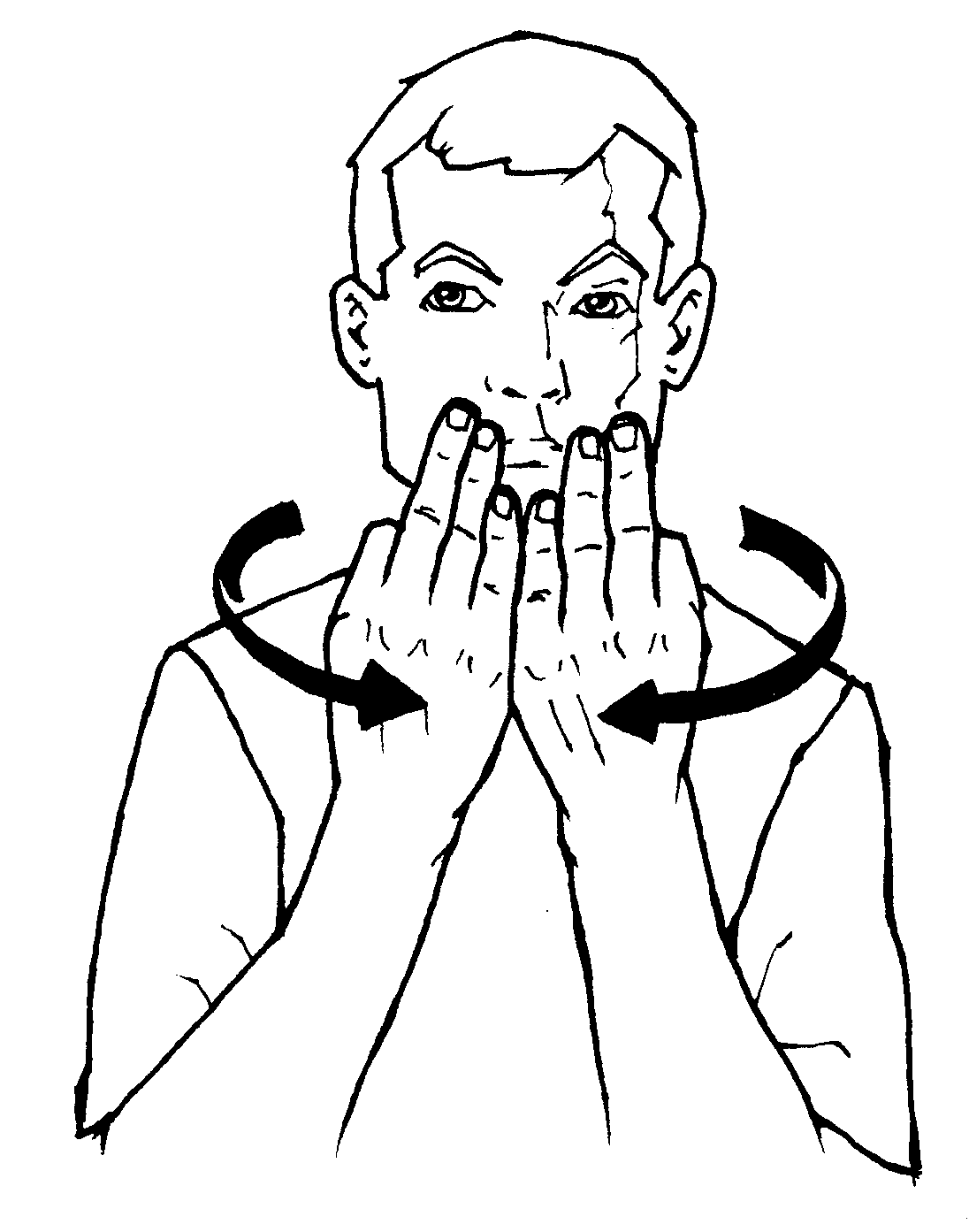ASL: Initialization / Initialized Signing
Available for a student report.
Initialization is the process of using the ASL fingerspelled letter that represents the first letter of an English word as the handshape for a sign.
For example, the signs CLASS and FAMILY are initialized signs.
FAMILY:
Warning: Overuse of initialization is frowned upon by the Deaf Community. While it is true that quite a few initialized signs have found their way into general usage in the Deaf community--you would do well to use initialization as little as possible if you are trying to develop your ASL skills.
Discussion:
A discussion regarding the initialized version of the initialized sign for SINGLE:
A person interested in signing writes:
<<OH....single...with an s and not the first finger on each side of the mouth. I see....that was a very English-type sign. I'm surprised you signed it that way. Hmm. Interesting. Is that how everyone is signing it now in ASL? Should I change that? I don't want to be left out of the loop. :)
Smile!! I showed my kids your signs and they thought it was so neat to be able to pull that up on the web. They also thought it was neat that I knew you. My kids are 6-8th grade and vary in ability levels from 1st-5th grade in reading levels. They all enjoy being able to see adult signers. I enjoyed being able to pull up your site in class. Thanks for the info!! Hope all is going well.
Michelle __________
Deaf Ed Teacher>>
Michelle,
(Please know that I think the world of you and that any defensive tone in this letter is just my natural inclination to argue ANYTHING from both sides. Such being the case, I'm not responding to you but rather to the people that think "one way is the right way" -- which, strangely enough, usually happens to be their way. )
Now, ...on with the discussion...
If a person were to have gone through the lessons starting with number 1 and working forward, they would get to lesson two which contained the vocabulary word "single." Then they'd go to the "single" page, and see the variations.
Please DO go to the page so you can see what I'm talking about:
http://www.lifeprint.com/asl101/pages-signs/single.htm
It takes a while to load because of the graphics, but you will notice that I also show the "index" finger version of the sign. You asked if that is how "everyone is signing it in ASL now?"
I've yet to see "everyone" sign ANYTHING the same.
I include the lesser known variations of signs on the quizzes to make sure my students are thoroughly familiar with a wide range of sign choices. It is an arguable fact that SOME culturally Deaf signers do sign it with an "S" and I expect my online students to learn that variation as well as the other variations.
You said that the "S" version of "single" is an "English type" sign.
My response is: No more so than the signs Aunt and Uncle are "English type" signs.
There are many, many legitimate, widely used ASL signs that are initialized. Here are a few for example: Congress, yellow, workshop, whale, Monday, rocket, ready, semester, nurse, project, system, patient/hospital, law, governor, elevator...and my favorite: "family."
No one in their right mind, (but plenty in a wrong mind) would be willing to dispute that "family" is a bona fide ASL sign used by hundreds of thousands of culturally Deaf people on a regular basis.
But, since initialization is such an easy target to bash, many purists like to wield their clubs with glee.
ASL is a living language though, and as such is constantly changing and incorporating new lexicon (vocabulary).
Now, back to the "single" sign--check out:
Costello, E., & Lenderman, L. (1994). Random House American sign language dictionary (1st ed ed.). New York: Random House.
You will notice that Elaine lists the side to side mini-sweeping motion version of single as the main version. She lists the initialized version as an "alternate sign." And she doesn't even mention the "index finger to the sides of the mouth" version that you suggested.
Does that "prove" the initialized version is "ASL?"
A man or woman convinced against his or her will, is a disbeliever still.
I could even jump on the other side of the fence and point out that the sign SINGLE has a non-initialized version that works well, (the index finger to the sides of the mouth) but the sign AUNT doesn't, therefore "SINGLE"-(initialized) is not as legitimate of an ASL sign as is AUNT. But then again, I could sign, "MY DAD, HIS SISTER" to mean AUNT though. Obviously, initialized signs for words like "I" and "WE" are not necessary in ASL. (Unless, perhaps, if you were using ASL to discuss English, heh.)
But, suffice to say, Elaine (the above named author/expert) --in addition to her own lifetime worth of expertise gained from interacting with thousands of Deaf people--employed the knowledge and expertise of over 80 "sign informants," (most of whom are deaf) to ensure the appropriateness of the content of that dictionary.
So, if one or two, (or 10 or 20) people choose to debate the issue, I suggest they go debate it with Dr. Costello and her team of 80 sign informants.
As for me, I'll keep including it, and various other (but certainly not all) initialized signs in my curriculum.
Best wishes, your friend,
Bill
Tuesday, Sept 2nd, 2008
I hereby coin a new word: "initiaphobia."
The fear of initialized signs.
Initiaphobia is generally spread by militant, prescriptive, ASL teachers.
--Bill Vicars
Katie Beaman & Bill Vicars
April 22, 2003Borrowed Language:
It is a well known fact that languages borrow from other languages they come in contact with. English uses words like guru (Hindi), weekend (French), and taco (Spanish). This is a natural phenomenon that cannot be escaped.
American Sign Language (ASL) also borrows from other languages. “Loan signs” are signs that are borrowed from other countries. Some of ASL is actually French Sign Language, introduced to American Deaf through Laurent Clerc. However, did you know that ASL borrows from English? Many signs use “initialization” to clarify a meaning. Sometimes initialized signs are created for a sign system, but many signs use the first letter (derived from English) to show an exact meaning. (For example, many colors in ASL like blue, green, and yellow are signed using the first letter of the word.)
Are these signs really English and not ASL? Of course not! These are natural ASL signs that are accepted by the Deaf community. Initialization of American Sign Language signs is a natural occurrence in ASL that won’t fade any time soon.
A partial list of widely accepted initialized signs:
Colors
Blue
Green
Yellow
Pink
Purple
Brown
Silver
Foreign countries
Foreign
Asia
Europe
Africa (on the face)
France
Mexico (old sign)
Hispanic
Italy (old sign)
Israel
Food
Vegetable
Fruit
French fries
Pizza
Chocolate
Vanilla
Lemon
Water
Beer
Wine
Dr. Pepper
Categories
Family
Agency/association
Class
Department
Group
Organization
Society
Team
Workshop
Religion
Religion
Church
Muslim
Temple
Missionary
Government
Government
Politics
Law
Congress
Legislature
State
Constitution
Will (last will)
Faculty
Testament
Staff
Vice president
Mayor
Federal
Agenda
Policy/Principle
Ethics
Code of Ethics
Cities/States
Texas
Dallas
Beaumont
Houston
Washington State
Chicago
New Orleans
St. Louis
Boston
Washington, D.C.
Philadelphia
Baltimore
Arizona
Hawaii
Medical
Medical
Hospital
Patient
Nurse
Client
Doctor
Penis
Toilet
Restroom
Infection
Insurance
Freedom
Free/freedom
Liberty
Save/safe
Independence
Directions
North
South
East
West
Left
Right
Holidays
Halloween (mask H)
Christmas
Easter
Retire
Thoughts
Imagine
Idea
Theory
Hypothesis
Fantasy
Philosophy
Opinion
Concept
Reason
Paranoid
Math
Math
Algebra
Geometry
Trigonometry
Calculus
Interest (related to money)
Rent
Ruler
Science
Chemistry
Biology
Weather
Winter
Season
School Signs
History
Language
University
Project
Program
Permission
Computer
Review
Resources
Results
Graduate
Grade
Principal
Grammar
Personal
Personal/personality
Attitude
Character
Nature (person’s nature)
Noble (“nature” with proud face)
Day signs
Monday
Tuesday
Wednesday
Thursday
Friday
Saturday
Day
Yesterday
World
World
International
Globe
Universe
Theatre
Character
Role
Role model
Name signs
Arbitrary name signs with initials are the U.S. norm (few are descriptive -more common in Europe and Asia)
Life
Life/live
Address
Health
Physical
Environment
Environment
Situation
Atmosphere
Culture
“Shoulder-to-hip” signs
Bosnia
King
Queen
Prince/princess
Christian
Lord
Royal
Messiah
“Chin” signs
Cafeteria
Restaurant
Twin
Nutrition
“Wrist” signs
Use
Business
Internship/intern
Function
doctor
nurse
Emotions
Emotion
Honest
“ILY” (I love you)
Jealous
Location signs
Place
Museum
Country
Visit
People signs
Gay
Lesbian
People
Communicate
Music signs
Music
Poetry
Concert/choir
Gambling signs
Bet
Chance
Ante
Miscellaneous
Island
Professional
Train (for a job)
Ready
Hurry
Office
Room
Videotape
Divorce
Appointment
Culture
Hard of Hearing
Quality
Producer (relating to movies)
McDonalds
Let
Try
Bell
Diamond (ring)
Cousin
Idiot
Note: You can find even more signs by going through a large sign language dictionary and looking for specific "letter" handshapes: For example under "N" you will find signs like:"N" signs
Natural/nation/normal
Negotiate
Neutral
Nephew
Niece
Nominate
No
Nun
Nurse
NorthVarious other initialized signs:
Identify
Interview
Time (era)
Semester
Respect
Honor
Faith



